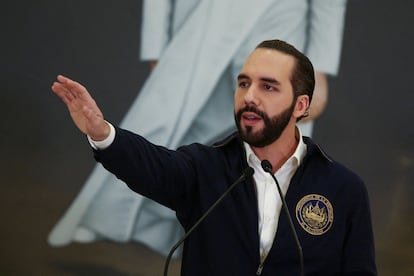El Salvador’s Bukele announces bid for re-election despite constitutional ban
The populist leader shares his decision one year after Supreme Court justices appointed by himself ruled that consecutive presidential terms should be allowed

El Salvador President Nayib Bukele on Thursday announced that he will run for re-election in the 2024 elections. This makes him the first president in El Salvador’s democratic history to seek a second five-year term in office.
The decision was made possible after the justices who sit in the Constitutional Chamber of the Supreme Court of Justice – and who were appointed by Bukele last year – ruled that two consecutive terms should be allowed despite a constitutional prohibition.
“After discussing it with my wife Gabriela and my family, I am announcing to the Salvadoran people that I have decided to run as a candidate for the presidency of the Republic,” said Bukele to the applause of followers standing outside the Presidential House on the occasion of Independence Day.
“After 201 years, we are finally living true independence. This has not been only thanks to the work of our government, but because we charted our own destiny and did not obey international dictates,” Bukele said in a speech broadcast on national radio and television. To justify his decision, Bukele said that “for the first time” in the 201 years of Salvadoran independence, his government has shown that it is on the “right” path. But the announcement renews fears of authoritarianism by a president who, critics argue, wishes to stay in power through illegitimate means.
El Presidente @nayibbukele ha anunciado esta noche al pueblo salvadoreño su decisión de correr como candidato a la Presidencia próximas elecciones presidenciales de El Salvador. pic.twitter.com/ap6yDT2PJW
— Casa Presidencial 🇸🇻 (@PresidenciaSV) September 16, 2022
Bukele, who was elected three years ago, maintains high approval ratings but has also been singled out for his authoritarian tendencies, drawing hundreds of complaints of human rights violations. He is also known for persecuting anyone who contradicts him.
In a September 2021 ruling, the Supreme Court judges who sit in the Constitutional Chamber said that the prohibition of immediate re-election contemplated in the country’s highest law was only applicable to a president who has already been in power for 10 years. Until then, according to Section 152 of the Constitution, presidents who had been in power for five years (as will be the case with Bukele in 2024) could not immediately seek a new term.
The Supreme Electoral Tribunal (TSE) announced that it would abide by this decision, on condition that the president step down six months before the end of his term.
Just like Nicaragua
“This announcement, which we already knew was going to happen, only serves to confirm how El Salvador is on the the path towards Nicaraguan-style authoritarianism,” said Eduardo Escobar, director of the Salvadoran citizen group Acción Ciudadana, in statements to EL PAÍS. “First the institutions are co-opted, then confrontational rhetoric is used against sectors that do not support the government, the re-election of the president is approved even though it is forbidden, and then comes the announcement about running for re-election. We are undoubtedly in the same logic of political and authoritarian control as Nicaragua.”
For Escobar, however, opposition to the president should be pragmatic: opponents should continue to fight for the 2024 presidential elections and avoid the “mistake” of the Venezuelan opposition, which decided not to run in the 2020 parliamentary elections, which they considered illegitimate, and “gave a margin for the ruling party to win and wield even more power.”
“Re-election in El Salvador is unconstitutional, it is illegitimate, it is not allowed,” said the head of Acción Ciudadana. “But despite that, the opposition has to find a way to gain a bigger share of power to try to balance out the political situation a little.” In Escobar’s opinion, this power should be sought in the Legislative Assembly and at the local level through municipal councils.
In 2019, Bukele, now 41, rose to power and ended three decades of two-party rule by the Farabundo Martí National Liberation Front (FMLN) and the Nationalist Republican Alliance (ARENA), which had taken turns in power. Driven by high approval ratings, Bukele took advantage of the overwhelming majority he obtained in parliament at the February 2021 elections to reform the judicial institutions to his liking and guarantee an exercise of power without checks and balances.
Tu suscripción se está usando en otro dispositivo
¿Quieres añadir otro usuario a tu suscripción?
Si continúas leyendo en este dispositivo, no se podrá leer en el otro.
FlechaTu suscripción se está usando en otro dispositivo y solo puedes acceder a EL PAÍS desde un dispositivo a la vez.
Si quieres compartir tu cuenta, cambia tu suscripción a la modalidad Premium, así podrás añadir otro usuario. Cada uno accederá con su propia cuenta de email, lo que os permitirá personalizar vuestra experiencia en EL PAÍS.
¿Tienes una suscripción de empresa? Accede aquí para contratar más cuentas.
En el caso de no saber quién está usando tu cuenta, te recomendamos cambiar tu contraseña aquí.
Si decides continuar compartiendo tu cuenta, este mensaje se mostrará en tu dispositivo y en el de la otra persona que está usando tu cuenta de forma indefinida, afectando a tu experiencia de lectura. Puedes consultar aquí los términos y condiciones de la suscripción digital.









































